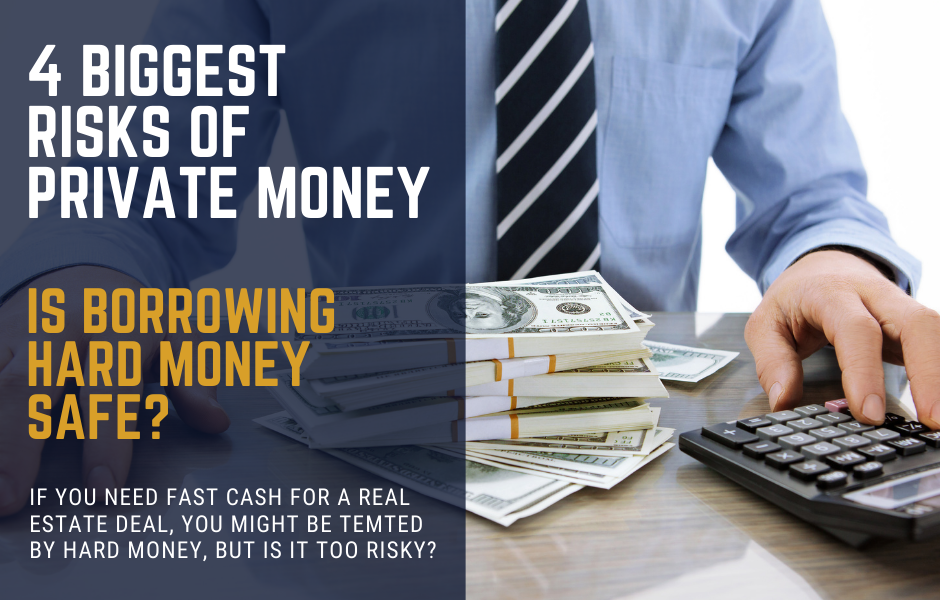Top 4 Hard Money Loan Risks and Scams for Lenders and Borrowers
Become a Private Money Lender: See Investor-Ready Private Lending Deals Every Thursday

David Garner
Top Hard Money and Private Money Scams and Risks for Lenders and Borrowers
Hard money and private money loans are an essential part of the real estate ecosystem…
…access to fast cash allows real estate investors (borrowers) to close a deal fast, and private lenders outside the traditional banking system tend to offer far more flexible terms.
Maybe your bank wont lend to you because you have poor credit, no credit, no proof of income or a bad debt-to-income ratio. Maybe they don’t like the property, the location, or the type of deal you’re doing. Whatever the reason, as a real estate investor you might need to use hard money or private money to fund your next deal.
For investors who want a more hands-off, passive investing strategy, lending money privately that is secured against real estate offers a great rate of return with the capital security of a physical asset that can be sold of to recoup your money in a worst case scenario.
When it works out, it works out well for both parties!
But there are plenty of risks to consider, and this type of borrowing and/or lending really isn’t for everyone.
In this article I will walk you through some of the biggest risks of using hard or private money loans as a borrower, and what you should look out for as a new or intermediate private lender.
Contents
- Risks for Borrowers
- Hard Money Scammers
- Predatory Lenders
- Impossible Loan Terms
- Understanding Loan Documents
- Deals That Fall Through
- Top Tips to Protect Yourself
- Risks for Lenders
- Default Risk
- Fraud Risk
- Illiquidity
- Market Risk
- Top Tips to Protect Yourself
- Conclusion
- References and Resources
Risks of Borrowing Hard or Private Money
As I have already mentioned, the appeal of hard or private money funding for real estate investors is fairly obvious…
But hard or private money is definitely not the holy grail of funding. I have seen plenty of real estate investors suffer heavy losses as a result of using (or trying to use) hard money to fund a deal.
Here are some of the biggest red flags, risks and scams to look out for when looking to access hard or private money.
Hard Money Scammers
The first thing you should be aware of before we even get to dodgy lenders, is the proliferation of outright scammers.
You’ll find these guys all over social media, in every real estate Facebook and LinkedIn group. They prey on newbie investors that get sucked in by the promise of easy cash with little or no checks.
Often, these guys are NOT actual lenders…
Some are just pretending to be lenders so as to attract potential borrowers. They create fake profiles – often using the info from real lenders – and then present themselves as a genuine lender.
Usually, the scammers ultimate goal is to get a prospective borrower to part with their cash. They do this by promising to fund a loan, but on the condition that the borrower pays some upfront costs and fees.
Once those fees are paid by an unwitting (often newbie) real estate investor who is super keen to get their deal across the closing line, the ‘lender’ will then usually come up with some problem that requires more fees. They will keep coming back for more and more cash upfront that they say is required to close the deal.
Often, the prospective borrower will keep sending money in the hope of getting the deal funded, but ultimately the fake lender will never close the deal, leaving the borrower seriously out of pocket to the tune of thousands of wasted dollars.
I’ve personally seen this a ton of times, and even nearly got caught myself early on in my real estate investing career.
Predatory Lenders
Once you navigate your way past the scammers (and their are LOTS of them) you then have to contend with genuine lenders that will try to stiff you.
Because private lending is classed as commercial lending, it is way less regulated than consumer lending. As such, the industry is prone to it’s fair share of bad actors.
While most private and hard money lenders conduct themselves to industry best practice, there are definitely a few things to watch out for…
… I have a full gamut of predatory lending practices, including exorbitant closing fees, ridiculous interest rates, and loan terms that lenders know will most likely result in a failure to perform on the part of the borrower, and ultimately a foreclosure or similar.
You may really want to get your deal done, but ultimately agreeing to loan terms that don’t fit the project, or you can’t honour, will result in you losing the property – and any of your own cash you put into the deal – to the lender.
Related: Are Private Money Lenders Bad?
How to Protect Yourself
Lenders do not tout for business in Facebook. There are typically way more people that want to borrow money than there are people that are willing and capable of lending. As such, genuine lenders will generally not need to tout for business from strangers on the internet. It seems silly to say it, but be very wary of strangers commenting on your social media posts claiming to want to lend you money. It happens, and people fall for it… a lot!
Be wary of ‘too good to be true’ terms. If a lender is offering terms that are generally better than the market, it is a good sign they might be a scammer. Hard money rates start at about 8% at the very lowest, and can be as high as 15%. Do your research to get a good idea of what multiple lenders are offering so that you understand realistic loan pricing in your area.
Meet face to face if you can. If your hard money lender is local, go visit their office. There is a lot to be said for the good old fashioned approach of eyeballing someone before you do business. This will also give you a chance to assess the professionalism of their operation.
Check that the lender is registered in NMLS. The Nationwide Multistate Licensing System (NMLS) is the national system of record and licensure for Mortgage Loan Originators (MLOs). Hard money lenders should have an NMLS number that you can check here. Private money lenders will most likely not have an NMLS number as they are private individuals making direct loans with their own cash.
Review the lender’s website. Most hard money lenders will have a website, and it should be professional. If you find your lender with a poor website littered with spelling and grammar errors, and little to no information about the actual people behind the business, walk away.
Ask for references and referrals. Again, it may seem a little old fashioned, but ask to speak to actual customers and business partners. Perhaps their attorney or banker can vouch for them. If they are unable to have anyone vouch for them then I would be very cautious indeed.
Check on your lender’s foreclosures. you can search the internet or look up record and the County Courthouse to find out how many properties the lender had foreclosed on. If a lender has lots of foreclosures it means they are slow to listen and quick to act when it comes to delinquent payments.
Related: The Ultimate Pre-Deal Checklist for Private Lenders
Impossible Loan Terms
One of the biggest risks of using private money or hard money is the fact that it is relatively expensive next to traditional bank financing.
Private lenders are more flexible in their approach to risk, and higher interest rates reflect their compensation for taking on this risk.
There are also a bunch of fees to consider, including upfront points, origination fees, documentation fees, and underwriting fees.
These all add up to thousands of dollars, a good portion of which is often requires to be paid out of pocket by the borrower.
You should also consider the loan to value, loan to contract, and term to maturity being offered.
I have seen plenty of cases of hard money guys lending on 6-month terms for a project that they know might take longer.
In the end, the lender ends up with the house and the borrower loses their deposit, as well as all the fees and interest they already paid, not to mention the money they may have ploughed into the project!
Another thing to consider is that private lenders are way less stringent than banks when it comes to confirming your ability to repay the loan. While a bank will look carefully at your proof of income, debt-to-income ratio and credit score, a private or hard money lender will not be so picky.
That means you could end up with a loan that you cannot afford to repay. It is up to you to make sure that you only take on debt that you are certain you can afford to repay.
Finally, watch out for lenders changing their loan terms right at the last minute before closing. I see this happen more and more nowadays, and often the new terms suck all the profit out of a deal, but the borrower has no option to either accept the new terms, or lose the deal.
Related: A Guide to Promissory Notes for Lenders and Borrowers
How to Protect Yourself
Make sue the term suit the project. If you are looking for funding for a long term rental, it is unlikely a 6-month loan will provide enough time to rehab, rent and season the property long enough to acquire long-term refinancing. Make sure you have extension clauses agreed and written in, just in case the property takes longer to refinance or sell.
Know your ability to repay. Sounds simple, right? Well, you’d be surprised at how many people take on debt they cannot afford. Make sure you have a handle on your income, living costs and lifestyle expenses, and make sure you can make the payment on your loan, otherwise you risk losing your property.
Check for Hidden Costs. The interest rate is not the only costs associated with private money loans. there could be late fees, administration fees, loan servicing fees and document preparation fees. All of this can start to snowball very quickly and you might find yourself struggling to catch up if you fall behind.
Beware of balloon payments. Most private loans will be relatively short term with a balloon payment to repay capital at maturity. The lender may also have built in a balloon to keep your payments where you need them. Make sure you are aware of any balloon payments because they will come around way faster than you think.
Make sure the terms haven’t changed. Things change all the time in real estate. Don’t be surprised if your lender changes the terms, fees or interest rates on your loan before closing as more information comes available through the title process. Check the paperwork you sign matches the terms you were offered.
Related: A Guide to Lien Position and Priority
Understanding Loan Documents
Private lenders tend to be much more helpful than banks when it comes to getting your real estate deal across the line. A closed deal for you means profit and income for them. But again, the lack of regulation in the private money space means loan documentation can be different every time.
Private lenders can write in whatever terms they want to make your particular deal work for them. It is crucially important that you understand the precise terms of the loan BEFORE you sign on the dotted line. This includes the processes and consequences for missing payments or failing to perform on any other terms.
How to Protect Yourself
Understand your lenders foreclosure process. Private lenders will generally foreclosure much quicker than a bank. You could risk losing your property if you fall just 1 payment behind. Check your paperwork and make sure you fully understand what qualifies as a late payment, what the consequences are, and what opportunity you have to remedy the situation.
Be aware of all your responsibilities. Often you will find private loans have terms and covenants other than simply making payments. This might include maintaining a minimum debt service coverage ratio (DSCR), or reporting requirements. Defaulting ion these non-monetary covenants could trigger a foreclosure, so make sure you negotiate sufficient time to remedy and default.
Know your legal rights Make sure you understand exactly what your rights are on a State and Federal level. You do not want to be pushed into a foreclosure when you may have some protections under law.
Deals That Fall Through
This is quite common. While banks will usually always follow through and fund a loan they have underwritten, hard money deals can collapse at the last minute for a variety of reasons.
Mostly this will come down to the lender being unable to access the funds they were going to use for the loan. Hard money lenders might be relying on 3rd party private investors to fund the loan, or they might be relying on cashflow from other investment they have made that end up going South.
Direct private lenders may back out because they suddenly need to use their funds elsewhere. Sometimes, they might just change their mind.
There is not a great deal you can do to prevent deals falling apart because lenders back out. It is always a good idea to have a backup plan, and to develop relationships with multiple lenders so you can call someone else if your original lender backs out.
View Lending Opportunities: Join 5,000+ private Investors and See New Lending Opportunities Every Week in our Private Lender Portal







